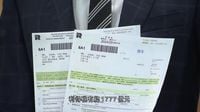The Inland Revenue Department of Hong Kong has issued 2.66 million individual income tax returns starting today, May 2, 2025, marking a significant step in the city’s fiscal operations. For the 2024-25 fiscal year, the overall tax revenue is projected to reach approximately $374.5 billion, reflecting a notable increase of 10% year-on-year.
This rise in tax revenue is attributed to several factors, including an increase in the number of taxpayers, a rise in taxpayers' assessable income, and a decrease in the number of applications for deferred tax payments. Specifically, salaries tax revenue is expected to amount to $88.9 billion, which is an increase of 11% compared to the previous year. The profits tax revenue, which constitutes nearly half of the overall tax revenue, is projected at $177.7 billion, up 4% from last year. Meanwhile, stamp duty revenue is expected to soar to $63.9 billion, representing a remarkable 30% increase, largely due to the buoyancy in the stock and property markets.
Mrs. Ingrid Yeung, the Commissioner of Inland Revenue, highlighted the role of the government's talent import schemes in boosting the number of taxpayers in Hong Kong. She noted, "The talent import schemes have indeed brought more taxpayers to Hong Kong. Additionally, we have observed that the income levels of taxpayers have increased, resulting in more individuals falling into the tax net." This influx of new taxpayers has contributed significantly to the rising tax revenue.
Looking ahead, the Inland Revenue Department anticipates that tax revenue for the 2025-26 fiscal year could reach $401.4 billion, which would represent a further increase of 7% compared to the current fiscal year. The expected growth is linked to the increasing number of new companies being established in Hong Kong and a rise in assessable profits for the 2024-25 fiscal year.
Additionally, changes to the tax structure are set to take effect this year. The two-tiered standard tax rate for salaries tax and personal income tax will see the first $5 million of income taxed at 15%, while any income exceeding $5 million will be taxed at 16%. This adjustment aims to streamline the taxation process and make it more equitable for taxpayers.
Moreover, the budget introduces new measures regarding deductions for mortgage interest and housing rent. The deduction limit will increase from $100,000 to $120,000 for taxpayers who meet specific conditions, such as living with a newly added child in Hong Kong for at least six months. Taxpayers and their spouses can also deduct a maximum of $100,000 per year for child care expenses.
In terms of profits tax, the 2024-25 assessment year will introduce a deduction for expenses related to reinstating leased premises. Additionally, the time limit for claiming tax allowances for industrial or commercial buildings or structures will be eliminated, providing further relief to businesses.
The budget also proposes a tax rebate of 8% for salaries tax, personal income tax, and profits tax for the 2024-25 year, capped at $1,500. This rebate will automatically reflect in the assessments, allowing taxpayers to benefit without needing to apply.
As the tax season unfolds, the Inland Revenue Department is set to manage the processing of these tax returns efficiently, ensuring that taxpayers receive the necessary support and guidance throughout the process. With the increasing tax revenue and the introduction of new tax measures, Hong Kong is positioning itself for a robust fiscal future.
In summary, the issuance of the 2.66 million tax returns marks a critical moment for Hong Kong’s financial landscape, with the government projecting a 10% increase in overall tax revenue for the upcoming fiscal year. This growth is fueled by a combination of new taxpayers entering the system, increased income levels, and favorable market conditions. As the administration implements changes to the tax structure, it aims to foster a more equitable and efficient tax environment for all residents.




